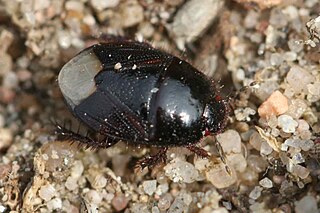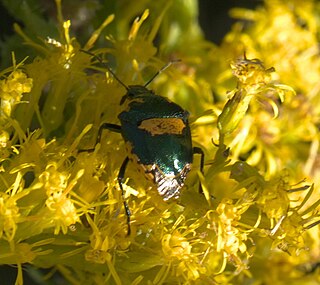
Scaptocoris is a genus of burrowing bugs in the family Cydnidae. There are at least four described species in Scaptocoris.

Perillus is a genus of predatory stink bugs in the family Pentatomidae. There are about seven described species in Perillus.
Vulsirea nigrorubra is a species of stink bug in the family Pentatomidae. It is found in the Caribbean.

Mormidea lugens is a species of stink bug in the family Pentatomidae found in the Caribbean, Central America, and Eastern North America. In Illinois, adults have been observed emerging from overwintering sites in late April, and continue to be observed until early November, and appear to be bivoltine in this area. Eggs are approximately 0.7 millimetres (0.028 in) in diameter, pale yellow, and laid in small clusters of 6 to 11 eggs. Adults are bronze in color, with a white-yellow border around the scutellum, and are 5.0–7.2 millimetres (0.20–0.28 in) in length. In laboratory conditions, at approximately 24 °C (75 °F), development from eggs to adults has been documented to take between 39 and 50 days, and appears to be affected by the species of host plant. Mormidea lugens has been documented to feed on timothy, sedges, as well as deer-tongue grass, and Bosc's panic-grass. It has been collected from pale sedge and wide-leaved spiderwort but has not observed feeding on these species, and deer-tongue grass appears to be an insufficient food source for development.
Sciocoris longifrons is a species of stink bug in the family Pentatomidae. It is found in North America.
Microporus obliquus is a species of burrowing bug in the family Cydnidae. It is found in Central America and North America.

Microporus is a genus of burrowing bugs in the family Cydnidae. There are at least four described species in Microporus.

Mormidea is a genus of stink bugs in the family Pentatomidae. There are about five described species in Mormidea.
Vulsirea is a genus of stink bugs in the family Pentatomidae. There are at least two described species in Vulsirea.
Cydnoides albipennis is a species of black bug in the family Thyreocoridae. It is found in North America.
Cydnoides is a genus of black bugs in the family Thyreocoridae. There are about five described species in Cydnoides.

Pangaeus is a genus of burrowing bugs in the family Cydnidae. There are about 14 described species in Pangaeus.
Banasa lenticularis is a species of stink bug in the family Pentatomidae. It is found in the Caribbean, Central America, North America, and South America.

Chlorocoris hebetatus is a species of stink bug in the family Pentatomidae. It is found in Central America and North America.

Chlorocoris is a genus of stink bugs in the family Pentatomidae. There are about six described species in Chlorocoris.

Camirus is a genus of shield-backed bugs in the family Scutelleridae. There are at least four described species in Camirus.

Oebalus ypsilongriseus is a species of stink bug in the family Pentatomidae. It is native to South America, where it is known to feed on rice crops, as well as cotton, barley, oat, and wheat.

Oebalus is a genus of stink bugs in the family Pentatomidae. There are about six described species in Oebalus.

Mecideini is a tribe of stink bugs in the family Pentatomidae. There is at least one genus, Mecidea, in Mecideini.

Stiretrus anchorago, commonly known as the anchor stink bug, is a species of predatory stink bug in the family Pentatomidae. It is found in Central America and North America. It is known to prey upon Epilachna varivestis and Hypera postica.









